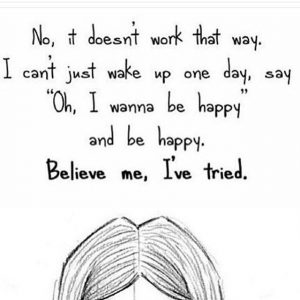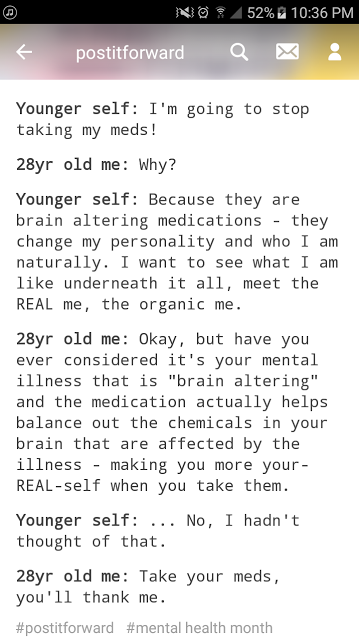… you’ll never believe what happened next!!!
You probably will believe it, actually, if you’re smart, which I’m going to assume you are.
I’ve been banging on a lot about the topic of medication lately. It’s not surprising that it’s something close  to my heart – after all, medicine has literally saved my life more than once. Which is also not surprising, since that’s what it’s there for – and yet, we keep being encouraged not to take it. What’s that about?
to my heart – after all, medicine has literally saved my life more than once. Which is also not surprising, since that’s what it’s there for – and yet, we keep being encouraged not to take it. What’s that about?
Unfortunately, there’s a lot of stigma around taking medication, particularly for mental illness. It’s very important we do everything we can to push back against that stigma, because medication helps people. And no one should avoid taking it, or feel bad about taking it, because of stigma or misinformation.
Let’s look at some facts.
Here’s a list of things taking medication isn’t:
- Weak. Often it is an incredibly hard choice to take medication. It’s not weak or “giving in” to do so.
- Taking the easy way out. See above. Taking medication can be really hard, especially at first while you’re trying to find the right thing for you and your body is getting used to it. It’s not only physically challenging, but you have to fight other people’s judgement and your own internalized stigma. None of that is easy.
- Altering yourself. Medication doesn’t change your personality. In fact, it may make you well enough that you get your personality back.
- Taking something that’s overprescribed, for no reason. There’s a lot of hysteria around overprescription of things like antidepressants and pain medication. Guess what? Doctors have a thing called an Oath. They’re there to try and get the best outcome for you. They’re not going to just chuck pills at you, no matter what the media would have us believe.
Here’s a list of things taking medication is:
- Brave. You’re making a choice to do everything you can to try and be well. That is very courageous.
- Smart. Assuming that you’ve talked to your doctor, you’ve read about the medication, and you’re making a well-informed choice – that’s smart. It’s smart to do the thing that gives you the best shot at getting well.
- Normal. This is an accepted, widespread way of treating mental illness. There’s nothing abnormal or strange about you and your choice, and you don’t have to feel like there is.
Have a think about this:
This one woman stopped taking her medication….
Let’s talk about one of the times I stopped taking my medication. This was about four years ago – if I stopped now, I’m pretty sure that I would die, or I’d come very close to it. That’s not hyperbole, I’m on a very sensitive mix of drugs. I’d for sure want to die, because medication withdrawal is one of the most difficult things I’ve ever been through and I never want to do it again, especially not cold turkey.
So. I was attempting to come off the antidepressant Sertraline. I did so under the advisement of my doctors, because it wasn’t helping me. They wanted me to move to a different antidepressant. But I said no.
See, I’d internalised a bunch of bullshit about how taking medication is “weak.” How it was much better to be “natural” – eat well, exercise, etc etc. That’d fix me, for sure.
Unfortunately, my brain didn’t get that memo.
I’ve been unmedicated a few times in my life. Mostly early on, prior to my diagnosis of depression. A couple of times in my 20s when, again, I felt like I should “go it alone.” And this time, when I came off Sertraline.
If the withdrawal process itself was hell, the following months were worse. I did everything I could to battle my depression and somehow think myself well. I went to therapy, I went to yoga, I exercised every day. It’s not that those things didn’t help. They absolutely do.
But mine is not an episodic or situational depression. It is a chronic chemical imbalance. And no amount of salad or aquajogging is going to change that.
Because I had internalized the stigma of taking medication, I left it much too long to try a new antidepressant. I suffered. In fact, perversely, I felt almost good about my suffering – like I was somehow stronger for it. Look at me, managing on my own! Take that, depression. Oh wait… you’re still here.
Medication is not magic. It doesn’t immediately or completely fix people. But it is often the stepping stone that is needed, so that things like therapy can actually be beneficial. I often hear people say, in a disparaging tone, that antidepressants are a “crutch.” Um, yes, they are. And isn’t that awesome? They help us move forward. Would you tell a person with a broken leg to man up and manage without their crutches? No? Then why is this any different?
Honestly, we’ve had hundreds of years of medical science working on creating drugs that help us. For me, there is no choice, because the other option is death. Why should I feel guilty for taking advantage of every opportunity I possibly can to improve my life?
We have medication that helps. And thank science for that.
Youthline: 0800 37 66 33. Free txt 234
Depression Helpline, free phone 0800 111 757 – Talk to a trained counsellor who can discuss your situation and find you the right support (tautoko). Help is available all day, every day. You can also text them (4202) or email them using this form.
Anxiety Line 0800 ANXIETY (2694 389) – Talk to a phone therapist who can give you support and help you understand anxiety and your experiences. This helpline is open all day, every day.
More resources: https://www.mentalhealth.org.nz/

